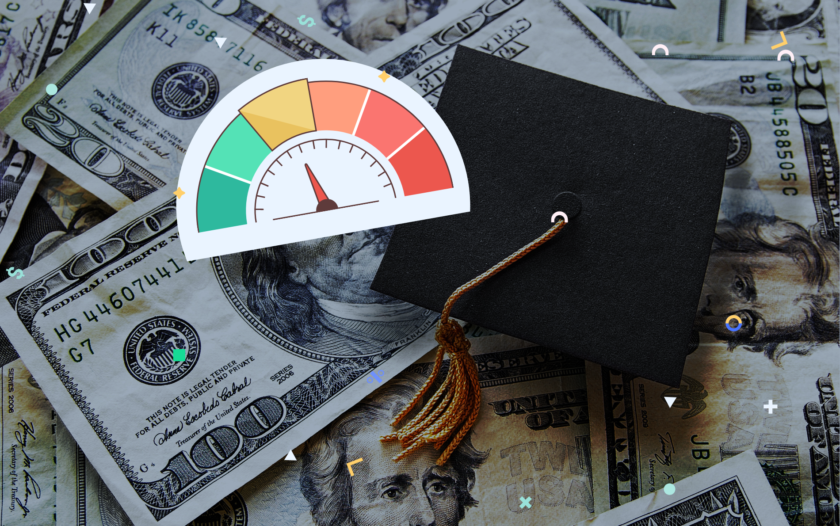How do Student Loans Affect Your Credit Score?
About Trevor
Trevor Mahoney is a financial services writer and content creator based out of Los Angeles, California. He holds a Bachelors of Science in Finance from Santa Clara University. In his free time, he enjoys hiking and lounging on the beach.
Read full bio
At a Glance
If you are one of the millions around the world who have student loan debt, you inevitably have wondered how do student loans affect your credit score? As with other types of debt, student loans and credit scores have a direct correlation. Making your payments on time will result in beneficial impacts on your credit score but missing those payments can cost you. Let’s take a more in-depth look at this relationship.
How do student loans affect your credit score?
Depending on how you handle your debt, student loans can either impact your credit score positively or negatively. In looking at do student loans affect your credit, the answer can be broken down by impact type:
Positive Impacts
Some of the positive impacts on your credit score that may result from student loans include:
- Strong payment history: By making all installment payments on-time and in-full, your lender will report a positive payment history to the credit bureaus which will likely increase your credit score.
- Different type of credit: One factor that goes into determining a credit score is your credit mix, meaning the types of credit you have. Generally, the credit bureaus would like to see a history with different types of credit, such as student loans and a credit card.
- Extensive credit history: Another factor that goes into your credit score is the length of your oldest credit account. While student loans will likely take years to repay, the total length of the credit account will increase which will help your credit score so long as you have a positive payment history on the account.
Negative Impacts
One the flip side of things, there are several negative impacts that may emerge from your student loans regarding your credit score such as:
- Bad payment history: If you are unable to meet your payments, your credit score will suffer. Federal lenders will wait up to 90 days to report late payments, but private lenders can report as soon as 30 days.
- You won’t gain benefits until repayment begins: Assuming you are currently in college, student loans won’t benefit your credit score until after you graduate and start repayments.
Can student loans help build credit?
One benefit of student loans credit score impact is that these installment loans allow you to build your credit. Whether this is your first credit account or not, taking on this new form of debt and making on-time, full payments every month will boost your credit score over time. Student loans affect credit scores negatively and positively but building your credit can be done with these loans.
How will refinancing student loans impact my credit?
When you refinance your student loan, a lender will make a hard inquiry into your credit to see if they want to offer you the loan at a more favorable (ideally) rate. In the short-term, a hard inquiry into your credit may result in a couple point drop on your score. This should be fixed within a couple months assuming you continue to have a good history with your credit. Rather than allowing multiple lenders to make hard inquiries into your credit score and compounding this effect, take prequalification surveys that don’t require this or see if there are any offers you are already preapproved for.
How will student loan debt cancellation affect my credit?
If your student loans are forgiven, you’re likely still wondering how do student loans impact credit score levels. While the actual debt will be wiped out from your credit score calculation, the history of payments that you made will remain. Therefore, any negative impacts resulting from your payment history will remain as well.
Assuming your payment history with student loan payments was positive, however, all of the positive benefits to your credit score from before the forgiveness will remain.
How credit scores will impact new student loans?
On the other side of things, your current credit score might play a role when you request student loans. Federal lenders will, for the most part, not require a credit check when taking out student loans which means your credit score has no impact on taking out the loan. Private lenders will almost always conduct a credit check.
A good-to-great credit score will allow you to be offered more favorable terms on your student loans including a lower interest rate. In the long run, this means that you will pay less money back than a person who gets the same loan at a higher interest rate due to a worse credit score.
FAQs
Yes, if you fail to make payments on your student loans, the responsibility will fall to the co-signer. If they are unable to make payments, then their credit score will be impacted just as much as yours. In looking at how student loans affect credit score, the implications do not stop with the primary borrower.
Student loans can affect your credit score within a single cycle after late payments are reported to the credit bureaus. The answer to how much do student loans affect credit score is quite a lot, which is why rectifying late payments before they are reported is so important.
As with all forms of debt, taking on student loans increases the debt portion of your debt-to-income ratio. Assuming your income has not changed, this ratio will become more debt-heavy than it was before. If you attempt to take on more debt concurrently with your student loans, and your income has not changed, a lender may be more apprehensive.









